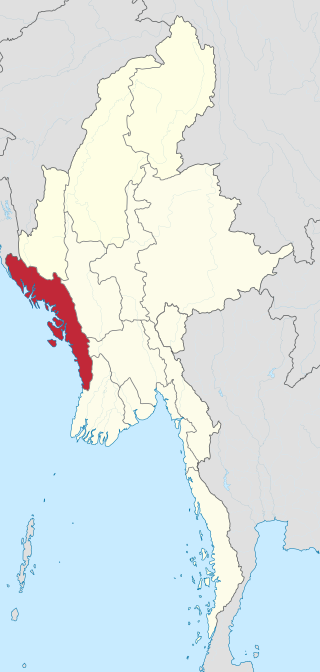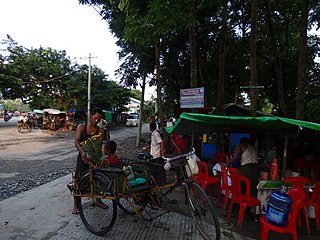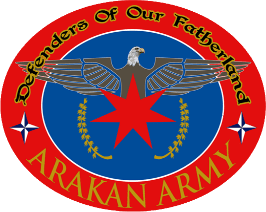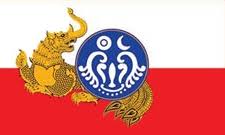
Rakhine State, formerly known as Arakan State, is a state in Myanmar (Burma). Situated on the western coast, it is bordered by Chin State to the north, Magway Region, Bago Region and Ayeyarwady Region to the east, the Bay of Bengal to the west and the Chittagong Division of Bangladesh to the northwest. It is located approximately between latitudes 17°30' north and 21°30' north and longitudes 92°10' east and 94°50' east. The Arakan Mountains or Rakhine Yoma separated Rakhine State from central Burma from North to South. Off the coast of Rakhine State there are some fairly large islands such as Ramree, Cheduba and Myingun. Rakhine State has an area of 36,762 square kilometres (14,194 sq mi) and its capital is Sittwe.

The Rohingya people are a stateless Indo-Aryan ethnic group who predominantly follow Islam and reside in Rakhine State, Myanmar. Before the Rohingya genocide in 2017, when over 740,000 fled to Bangladesh, an estimated 1.4 million Rohingya lived in Myanmar. Described by journalists and news outlets as one of the most persecuted minorities in the world, the Rohingya are denied citizenship under the 1982 Myanmar nationality law. There are also restrictions on their freedom of movement, access to state education and civil service jobs. The legal conditions faced by the Rohingya in Myanmar have been compared to apartheid by some academics, analysts and political figures, including Nobel laureate Bishop Desmond Tutu, a South African anti-apartheid activist. The most recent mass displacement of Rohingya in 2017 led the International Criminal Court to investigate crimes against humanity, and the International Court of Justice to investigate genocide.

The Naf River is an international river marking the border of southeastern Bangladesh and northwestern Myanmar.
In Myanmar, terrorism is defined by the country's counter-terrorism law and its subsections, which is interpreted by the Anti-Terrorism Central Committee and enforced by the government of Myanmar. Two groups are currently listed as terrorist organisations in accordance with Myanmar's counter-terrorism law; the Arakan Rohingya Salvation Army (ARSA), which was added on 25 August 2017, and the Arakan Army, which was added on 18 January 2019. The SPDC military government called the Vigorous Burmese Student Warriors (VBSW) "terrorists" after their role in the 1999 Myanmar Embassy siege, but the group was never legally declared as such.

Insurgencies have been ongoing in Myanmar since 1948, the year the country, then known as Burma, gained independence from the United Kingdom. The conflict has largely been ethnic-based, with several ethnic armed groups fighting Myanmar's armed forces, the Tatmadaw, for self-determination. Despite numerous ceasefires and the creation of autonomous self-administered zones in 2008, many armed groups continue to call for independence, increased autonomy, or the federalisation of the country. The conflict is the world's longest ongoing civil war, having spanned more than seven decades.

Buthidaung is a town in Rakhine State, in the westernmost part of Myanmar (Burma). It is the administrative seat of the Buthidaung Township. Buthidaung lies on the west bank of the Mayu river, and experienced severe flooding in June 2010 and July 2011. Buthidaung is 16 miles east from Maungdaw. The two towns are connected by two tunnels through the Mayu mountains that were built in 1918.
The 2012 Rakhine State riots were a series of conflicts primarily between ethnic Rakhine Buddhists and Rohingya Muslims in northern Rakhine State, Myanmar, though by October Muslims of all ethnicities had begun to be targeted. The riots started came after weeks of sectarian disputes including a gang rape and murder of a Rakhine woman which police allege was committed by three Rohingya Muslims. On 8 June 2012, Rohingyas started to protest from Friday's prayers in Maungdaw township. More than a dozen residents were killed after police started firing. A state of emergency was declared in Rakhine, allowing the military to participate in administration of the region. As of 22 August 2012, officially there were 88 casualties: 57 Muslims and 31 Buddhists. An estimated 90,000 people were displaced by the violence. Around 2,528 houses were burned; of those, 1,336 belonged to Rohingyas and 1,192 belonged to Rakhines.

The Rohingya conflict is an ongoing conflict in the northern part of Myanmar's Rakhine State, characterised by sectarian violence between the Rohingya Muslim and Rakhine Buddhist communities, a military crackdown on Rohingya civilians by Myanmar's security forces, and militant attacks by Rohingya insurgents in Buthidaung, Maungdaw, and Rathedaung Townships, which border Bangladesh.

The Arakan Army is an ethnic armed organisation based in Rakhine State (Arakan). Founded on 10 April 2009, the AA is the military wing of the United League of Arakan (ULA). It is currently led by commander in chief Major General Twan Mrat Naing and vice deputy commander Brigadier General Nyo Twan Awng. The Arakan Army states that the objective of its armed revolution is to restore the sovereignty of the Arakan people. In a February 2024 interview, Twan Mrat Naing claimed that the AA had grown to at least 38,000 troops. Anthony Davis, an expert of military and security, rejected this claim and estimated that it has at least 15,000 troops in Chin State and Rakhine State, in adition to around 1500 in Kachin and Shan State. In the early 2010s, the Arakan Army fought alongside the Kachin Independence Army (KIA) against the Tatmadaw in the Kachin conflict. Following the 2016 outbreak of conflict in Rakhine state, AA became more heavily involved in the Arakan region. In 2019, AA would launch attacks on state security forces and the Myanmar Army would respond heightening clashes. The AA reached a ceasefire in late 2020 after eroding the central government's control in northern Rakhine. The power vacuum would be filled by the AA over the next 18 months with state-building efforts, like their COVID-19 vaccine rollouts.

The Arakan National Party, is a political party in Myanmar (Burma), representing the interests of the Rakhine people in Rakhine State and Yangon Region. The party was founded on 13 January 2014 and registered with the Union Election Commission on 6 March 2014. The chairman of the ANP is Thar Htun Hla. The party is known for its hardline ethnic nationalist stance, as well as its Islamophobic and anti-Rohingya positions. Some members of the party were involved in instigating violence against Rohingya people during the communal riots in 2012, which left dozens dead and thousands homeless.

The Rohingya Solidarity Organisation (RSO) is a Rohingya insurgent group and political organisation. It was founded in 1982 following a large scale military operation conducted by the Tatmadaw. The group discontinued its armed rebellion in 1998 but rearmed itself following the 2021 Myanmar coup d'état.
The Arakan Rohingya Islamic Front (ARIF) was a Rohingya insurgent group active in northern Rakhine State, Myanmar (Burma). The group was made up of Rohingya fighters led by Nurul Islam, a Yangon-educated lawyer. The group was created after uniting the remnants of the Rohingya Patriotic Front (RPF) and a defecting faction of the Rohingya Solidarity Organisation (RSO) that was under the command of Nurul Islam.
Nurul Islam is a Rohingya political activist and Yangon-educated lawyer from Myanmar (Burma). He is the president of the Arakan Rohingya National Organisation (ARNO) and lives with his family in London, the United Kingdom.

The Arakan Rohingya Salvation Army (ARSA), formerly known as Harakah al-Yaqin, is a Rohingya insurgent group active in northern Rakhine State, Myanmar. According to a December 2016 report by the International Crisis Group, it is led by Ataullah abu Ammar Jununi, a Rohingya man who was born in Karachi, Pakistan, and grew up in Mecca, Saudi Arabia. Other members of its leadership include a committee of Rohingya émigrés in Saudi Arabia.

The Rohingya genocide is a series of ongoing persecutions and killings of the Muslim Rohingya people by the military of Myanmar. The genocide has consisted of two phases to date: the first was a military crackdown that occurred from October 2016 to January 2017, and the second has been occurring since August 2017. The crisis forced over a million Rohingya to flee to other countries. Most fled to Bangladesh, resulting in the creation of the world's largest refugee camp, while others escaped to India, Thailand, Malaysia, and other parts of South and Southeast Asia, where they continue to face persecution. Many other countries consider these events ethnic cleansing.
Violent clashes have been ongoing in the northern part of Myanmar's Rakhine State since October 2016. Insurgent attacks by the Arakan Rohingya Salvation Army (ARSA) have led to sectarian violence perpetrated by Myanmar's military and the local Buddhist population against predominantly Muslim Rohingya civilians. The conflict has sparked international outcry and was described as an ethnic cleansing by the United Nations High Commissioner for Human Rights. In August 2017, the situation worsened and hundreds of thousands of refugees fled Myanmar into Bangladesh, with an estimated 500,000 refugees having arrived by 27 September 2017. In January 2019, Arakan Army insurgents raided border police posts in Buthidaung Township, joining the conflict and beginning their military campaign in northern Rakhine State against the Burmese military.

The Bangladesh–Myanmar border is the international border between the countries of Bangladesh and Myanmar. The border stretches 271.0 kilometres, from the tripoint with India in the north, to the Bay of Bengal in the south. About 210 km (130 mi) of the border is fenced, with the government of Myanmar announcing in 2017 that it was planning to fence off the rest of the border.

The Mayu Frontier District was a short-lived administrative zone of Burma which existed between 1961 and 1964. It covered the Maungdaw District of present-day Rakhine State in the historical region of Arakan. The zone was administered directly from the capital Rangoon.

On 25 August 2017, Hindu villages in a cluster known as Kha Maung Seik in the northern Maungdaw District of Rakhine State in Myanmar were attacked and 99 Bengali Hindu villagers were massacred by Muslim insurgents from the Arakan Rohingya Salvation Army (ARSA). A month later, the Myanmar Army discovered mass graves containing the corpses of 45 Hindus, most of whom were women and children.
The Three Brotherhood Alliance, also known as Brotherhood Alliance, is an alliance between the Arakan Army, Myanmar National Democratic Alliance Army, and the Ta'ang National Liberation Army formed in June 2019.












